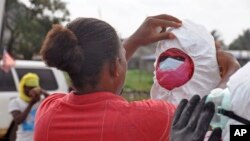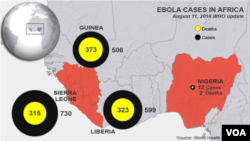The World Health Organization classified Kenya as a high-risk area for transmission of the deadly Ebola virus on Wednesday, as Sierra Leone reported that a second leading physician has died of the disease.
Even though there have been no reported cases of Ebola in Kenya, the country’s role as a transportation hub in East Africa makes it more vulnerable to the disease, WHO said.
WHO representative Dr. Custodia Mandlhate told reporters on Wednesday that WHO has classified Kenya as level 2, meaning at high risk for transmission.
In Sierre Leone, chief medical officer Brima Kargbo said Modupeh Cole, a senior physician in the capital Freetown who had been "instrumental in the fight against the Ebola virus," had died of the disease.
Cole's death came two weeks after the country's only virologist and leading Ebola expert, Humarr Khan, succumbed to the tropical disease.
Also, the last known doses of ZMapp, an experimental drug to combat Ebola, were to arrive Wednesday in Liberia, where the government is scrambling to save two infected doctors.
They would be the first Africans known to receive the controversial treatment.
The debate over experimental treatments and vaccines will continue, however, as Canada has promised to donate 800 to 1,000 doses of its untested Ebola vaccine to WHO. Questions already are being asked about who will get it and how scientists will determine if it works.
Nigeria death toll rises
In Nigeria, an ECOWAS staff member has become the third person in the country to die of Ebola fever, the Economic Community of West African States said.
Jatto Asihu Abdulqudir, 36, a protocol assistant, had traveled to an ECOWAS function in Nigeria with Patrick Sawyer, a Liberian man who was ill with Ebola and flew to Lagos last month.
Abdulqudir later fell ill and had been placed under quarantine.
The country has reported 10 cases of Ebola since Sawyer arrived on July 20.
WHO reported on Wednesday that there were 128 new Ebola cases and 56 deaths in West Africa in the past two days, raising the death toll from the worst ever outbreak of the disease to 1,069.
Since the outbreak was identified in March, there have been a total of 1,975 confirmed, probable and suspected Ebola cases in Guinea, Liberia, Sierra Leone and Nigeria, WHO said in a statement.
Most of the deaths have occurred in Guinea, Liberia and Sierra Leone.
Nigerian nurse skips quarantine
Separately, a nurse who had had close contact with Ebola victim Sawyer skipped quarantine in Lagos and headed to her home in the southeastern city of Enugu, where she had contact with 20 other people, the government said on Wednesday.
Information Minister Labaran Maku said the nurse, herself a suspected case, and her 20 contacts were all under surveillance in Enugu, bringing the total number being watched in the country to 189.
Her action highlights the risk of an outbreak in Lagos, a southwestern megacity of 21 million people, the majority of whose inhabitants are migrants from other parts of the country and other West African countries.
“One of the nurses that was involved with the treatment of the index case, unfortunately, disobeyed medical instructions and somehow traveled to Enugu,” Maku told reporters after a weekly cabinet meeting with President Goodluck Jonathan.
AU summit
The outbreak has prompted the African Union (AU) to expand a September summit in Burkina Faso to address the issue.
AU social affairs commissioner Mustapha Sidiki Kaloko told the VOA the AU does not believe Burkina Faso's close proximity to Ebola-stricken countries will be a safety risk.
"We are aware of the problems. We are aware of the precautions that we need to take," Kaloko said. "But remember, there are about 2 million people in Ouagadougou and they are being looked after in terms of the issues of the Ebola epidemic. So, the institutions are going to be put in place."
In another development, the Confederation of African Football said Wednesday that two African Cup qualifying matches that were set to be held in Guinea and Sierra Leone next month would be moved to other countries.
The group did not announce the new venues.
Meanwhile, Germany urged its citizens to leave Sierra Leone, Guinea and Liberia due to the Ebola outbreak in those West African nations hardest hit by the virus.
The foreign ministry announced the government directive on Wednesday, but said the appeal for nationals to leave did not apply to medical workers or diplomatic staff.
The disease has no known cure.
Mohammed Yusuf contributed to this report from Nairobi. Some information for this report provided by Reuters and AFP.






